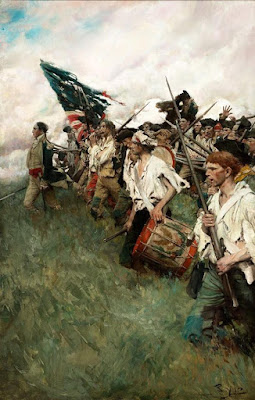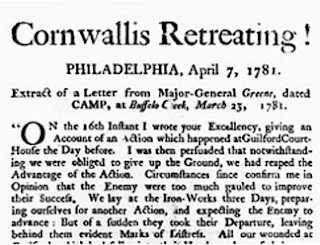In my last blog post, I discussed the origin of the term "Spy" and hinted at its use as a naming rubric for 18th-century newspapers. Now, a deeper dive into the subject of newspapers of the American Revolution.
A Literate Frontier
By the mid-1760s, there were 24 weekly newspapers in the 12 colonies, and satirical attacks on the government became common. Weekly newspapers in major cities and towns were strong symbols of patriotism, although a few Loyalist papers still existed.
 |
| Twelve of the British colonies had 24 newspapers |
Spy as a Newspaper
So, we can see that using the name “Spy” for a newspaper matches the origin of the word and its broader use. A newspaper’s staff and contributors observe, question, watch, and follow closely. At least, that is the hope of the public, who rely on their objectivity and fairness. As American society became more literate, the influence of the press increased.
Turbulent Times
The turbulent years between 1775 and 1783 were a time of great trial and disturbance for newspapers. Interruption, suppression, and lack of support significantly hindered their growth. Although there were forty-three newspapers in the United States when the Treaty of Paris was signed in 1783, compared with thirty-seven at the time of the Battle of Lexington in 1775, only about a dozen published regularly during that period. Curiously, not one newspaper in the larger coastal cities—Boston, New York, and Philadelphia—published uninterrupted throughout the war.
 |
| Voices of Rebellion |
Obstacles
The nature of the rebellion contributed to some of these issues. When the colonial forces were in control, Loyalist papers were suppressed. Conversely, during the British occupation, patriot papers were either dispersed, discontinued, or temporarily converted into loyalist publications until the patriots regained control. As a result, some newspapers from coastal cities moved inland to continue publishing. War-related challenges led to logistical problems, including shortages of paper, ink, and other essential materials. This led to the production of poor-quality papers or the skipping of issues to conserve resources.
 |
| Papers often ran political cartoons and caricatures that bordered on the absurd |
The Massachusetts Spy
Let’s examine the paper that exemplifies the kind of “Spy” we are discussing. Isaiah Thomas's Massachusetts Spy, published in Boston and Worcester, was often close to being shut down from its founding in 1770 through 1776 and during the American Revolution. Between 1771 and 73, the Spy featured writings from several anonymous political commentators who called themselves "Centinel," "Mucius Scaevola," and "Leonidas." They shared similar views on issues, kept patriot concerns on the front page, and responded to attacks from pro-government papers. Rhetorical combat was a patriot strategy that explained current issues and fostered patriotism without outright rebellion. The columnists addressed the colonists as an independent people, linked to Britain only through a voluntary legal compact. The Spy soon expanded its radicalism to a logical conclusion. Later, when articles from the Spy were reprinted in other papers, the entire country was prepared for Tom Paine's influential patriotic statement: Common Sense in 1776.
 |
| A critical voice in its heyday |
Who was Isaiah Thomas?
We are not talking about a legendary NBA player but about a legendary newspaperman. Our Isaiah Thomas was born in Boston, Massachusetts, and apprenticed in July 1756 to Zechariah Fowle, a Boston printer, with whom he formed a partnership in 1770. This led to the publication of the Massachusetts Spy. The partnership dissolved after a few months, but Thomas continued publishing alone. He had a motto for his paper: “Open to all parties, but influenced by none.” Sort of the “Fair & Balanced” of its day. The Spy initially published three times a week, but under Thomas’s sole ownership, it became a semi-weekly, and then, in 1771, a weekly. The Spy championed the Whig cause early on, which led to the British government's attempt to suppress it. Massachusetts’s last Royal governor, Thomas Hutchinson, ordered the attorney general to prosecute Thomas, but the grand jury failed to find cause for an indictment.
 |
| Isaiah Thomas holds an essential place in America's publishing pantheon |
More Flash than Bang?
The overall spirit of the era generated many mottoes, editorials, letters, and poems. At the beginning of the struggle, both editorials and communications called for united resistance to oppression, praised patriotism, and condemned tyranny. As time passed, these patriotic appeals grew stronger and shaped public opinion. Later, the idea of independence took shape, and debates about government were held. Sadly (or perhaps fortunately), enthusiasm for the cause often overshadowed journalistic standards, leading to exaggerated or even false reports.
A Struggle of Ideas
Despite their flaws, the newspapers of the Revolution were a powerful force in uniting people's feelings, sparking a shared sense of purpose, interest, and vision among the separate colonies, and fostering the determination to see the war through to a successful conclusion. They were often more focused than the people themselves and carried a significant share of the responsibility for inspiring and sustaining the often discouraged and indifferent public spirit. In this way, they played a vital role in guiding the thirteen struggling colonies through a long and seemingly impossible fight that resulted in an unlikely victory.
 |
| The struggle of ideas led to and buttressed the struggle for independence |

Excellent. I enjoyed this very much. Thank you.
ReplyDeleteVery informative read. Thank you very much
ReplyDelete